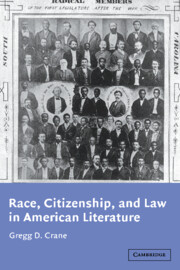Book contents
- Frontmatter
- Contents
- Acknowledgments
- Introduction
- Chapter 1 Higher law in the 1850s
- Chapter 2 The look of higher law: Harriet Beecher Stowe's antislavery fiction
- Chapter 3 Cosmopolitan constitutionalism: Emerson and Douglass
- Chapter 4 The positivist alternative
- Chapter 5 Charles Chesnutt and Moorfield Storey: citizenship and the flux of contract
- Notes
- Index
Introduction
Published online by Cambridge University Press: 22 September 2009
- Frontmatter
- Contents
- Acknowledgments
- Introduction
- Chapter 1 Higher law in the 1850s
- Chapter 2 The look of higher law: Harriet Beecher Stowe's antislavery fiction
- Chapter 3 Cosmopolitan constitutionalism: Emerson and Douglass
- Chapter 4 The positivist alternative
- Chapter 5 Charles Chesnutt and Moorfield Storey: citizenship and the flux of contract
- Notes
- Index
Summary
To merit the near religious veneration it has received, the U. S. Constitution has had to represent something different from and better than a democratic majority's power to enact its will. As Edwin Corwin notes in his landmark essay on the higher law background of the Constitution, most Americans have revered the national charter because they believe it to embody universal principles of justice. And despite the obvious and manifold injustices of American history, this “constitutional faith” in Justice Hugo Black's apt term, has not been wholly misplaced. In its various formulations, the higher law conviction that, in Martin Luther King's words, “an unjust law is no law” has had a marked impact on American constitutionalism, inspiring such milestones as the Declaration of Independence, the Bill of Rights, the Civil War amendments, the Nineteenth Amendment (women's suffrage), Brown v. Board of Education (1954), the Civil Rights Act of 1964, the Voting Rights Act of 1965, and Romer v. Evans (1996).
To illustrate the ethical basis of the American constitutional system, Chief Justice Earl Warren's 1970 lecture “All Men Are Created Equal” quotes the famous lines from “The New Colossus” by Emma Lazarus, in which the “Mother of Exiles” says to the world, “Give me your tired, your poor, / Your huddled masses yearning to breathe free.” Consistent with the heterogeneous American community suggested by Lazarus's poem, Warren imagines culturally heterodox experience as granting one special insight into the nature of justice.
- Type
- Chapter
- Information
- Race, Citizenship, and Law in American Literature , pp. 1 - 11Publisher: Cambridge University PressPrint publication year: 2002

